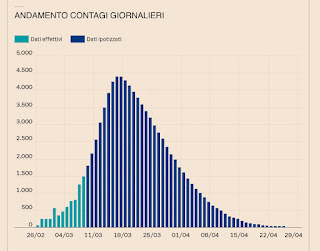March 19: A probability game.
Contagion is a probability "game", and, unfortunately, just as is the
case for exponential growth phenomena, people have a hard time wrapping
their brains around probability effects. Each type of virus has its one
favorite mode of transmission. That is the mode in which you are most
likely to be affected. For instance Measles can easily stay airborne and
each case typically infects 12 to 18 others if unchecked. The number is
about six for polio, smallpox, and rubella, and, fortunately,
only two to three for COVID-19. The 2-3 number says something about
how it is likely to be transmitted. Earlier this month, CDC reported
that the rate of symptomatic infection among a patient’s household
members was 10.5%. The rate among other close contacts was 0.45%. This
is consistent with the "droplet spread" mode of transmission rather than
the airborne transmission of Measles. Which, again, doesn't mean that
there might not been some virus "in the air"... just that the most
likely mode is what has been widely reported: direct (due to sneezing
etc.) and indirect (touching surfaces where the droplets have landed or
which have been touched by others).
Another word of caution, from my point of view as scientist. There is a lot that we don't know about this virus, and normally the scientific process would move very slowly to establish solid knowledge. This would take the form of experiments and studies that would end up in peer reviewed publications. This process would normally take months or years. Unfortunately we are all flying by the seat of our pants at this point, and all kinds of "studies" are rushed out which may turn out to have severe shortcomings... but it's completely understandable that there is a hunger for knowledge, even if "tentative". Still I would recommend that we pay close attention to bodies like CDC and WHO who have the people with the experience to make the best judgements at this point.
Another word of caution, from my point of view as scientist. There is a lot that we don't know about this virus, and normally the scientific process would move very slowly to establish solid knowledge. This would take the form of experiments and studies that would end up in peer reviewed publications. This process would normally take months or years. Unfortunately we are all flying by the seat of our pants at this point, and all kinds of "studies" are rushed out which may turn out to have severe shortcomings... but it's completely understandable that there is a hunger for knowledge, even if "tentative". Still I would recommend that we pay close attention to bodies like CDC and WHO who have the people with the experience to make the best judgements at this point.

Comments
Post a Comment